
"Mountains" is a 1986 song by American musician Prince and The Revolution, from his eighth album, Parade (1986), and the soundtrack to the film Under the Cherry Moon. It was written by The Revolution members Wendy & Lisa together with Prince. The extended 12" single version of the song runs nearly ten minutes. It reached number 23 in the US but only 45 in the UK. The B-side was the instrumental "Alexa de Paris", one of the few tracks from this project featuring a guitar solo. Both songs appear in the film Under the Cherry Moon, with the video for "Mountains" playing as the credits roll. The version shown on MTV to promote the single was in color as opposed to the film's black-and-white version.
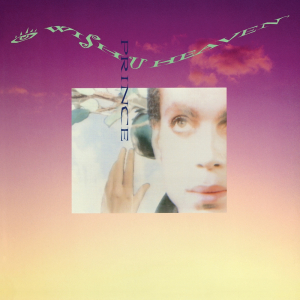
"I Wish U Heaven" is a song by Prince, and the third single from his 1988 album, Lovesexy. The 12" single is a substantially extended three-part suite which runs over ten minutes. This song was a replacement for "The Line", an upbeat jam featuring Boni Boyer and Sheila E. on backing vocals. "I Wish U Heaven" is a joyful, spiritual song with few lyrics
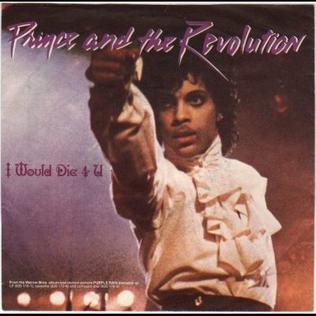
"I Would Die 4 U" is a song by Prince and the Revolution, the fourth single in the US from their 1984 album, Purple Rain. The up-tempo dance song was a top 10 hit—the final one from the album—in the US, reaching number 8 on the Billboard Hot 100.

"Let's Go Crazy" is a 1984 song by Prince and The Revolution, from the album Purple Rain. It is the opening track on both the album and the film Purple Rain. "Let's Go Crazy" was one of Prince's most popular songs, and was a staple for concert performances, often segueing into other hits. When released as a single, the song became Prince's second number-one hit on the Billboard Hot 100, and also topped the two component charts, the Hot R&B/Hip-Hop Songs and Hot Dance Club Play charts, as well as becoming a UK Top 10 hit. The B-side was the lyrically controversial "Erotic City". In the UK, the song was released as a double A-side with "Take Me with U".

"Thieves in the Temple" is a song by American musician Prince from the 1990 soundtrack album Graffiti Bridge. Added at the last minute, it was the final song recorded for the album. "Thieves in the Temple" topped the US R&B chart and became a number six hit in the US, and a number seven hit in the UK. The single also peaked at number nine on the dance chart.

"Controversy" is a song by American musician Prince, the lead single and title track to his 1981 album. The song addresses speculation about Prince at the time such as his sexuality, gender, religion, and racial background, and how he could not understand the curiosity surrounding him.

"Pop Life" is a song by Prince and the Revolution. It was the second US single from their 1985 album, Around the World in a Day, reaching number 7 in the US charts, becoming Prince's eighth top-ten hit in a two-year span.
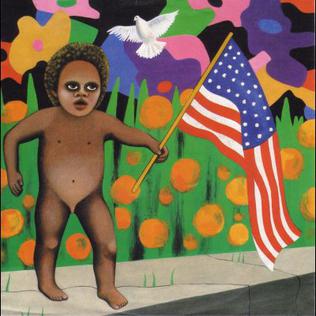
"America" is a song by Prince and The Revolution. It was the final US single from the group's 1985 album, Around the World in a Day.

"Scandalous" is the eighth track on Prince's soundtrack album Batman and was released as the album's fourth single, five months after the album was released. The music is attributed to Prince and his father, John L. Nelson. A maxi single was released after the single titled The Scandalous Sex Suite, which contained a three-part 19-minute suite of the song "Scandalous", with the three parts named The Crime, The Passion, and The Rapture. Kim Basinger, who was dating Prince at the time and who also played the character Vicki Vale in Batman, also appeared on the maxi single.

"Let's Pretend We're Married" is a song by American musician Prince from his 1982 album 1999. It was the final US single from the album and peaked at number 52 in the US.
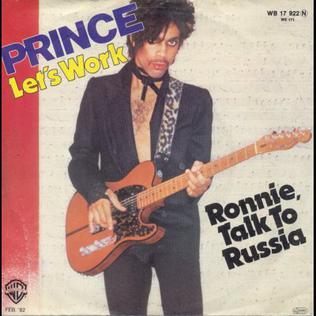
"Let's Work" is a song by Prince, released as the second single from his 1981 album Controversy. The song originates from a dance called "the Rock" that local kids were doing at the time in Minneapolis. Prince responded quickly with a track called "Let's Rock", and wished to quickly release it as a single. Warner Bros. refused, and a disappointed Prince did not include the song on Controversy, saying the phase had passed. Instead, the song was updated with new lyrics and possibly new music and became "Let's Work"—one of his most popular dance numbers.

"Why You Wanna Treat Me So Bad?" is the US follow-up single to Prince's first big hit, "I Wanna Be Your Lover". It is also Prince's first rock and roll-inspired single release. It did not make the top 40 of the Billboard Hot 100 charts, although it did reach #13 on the R&B Singles charts. The lyrics explore a relationship with a cruel lover. The song prominently features guitar and bass, with the keyboard featured in a less prominent role. A highlight of the song is a soaring guitar solo at the end, played by Prince himself.

"Still Waiting" was the third US single from Prince's second album, Prince. It was Prince's first ballad to be released as a single and was mildly popular on the R&B chart, reaching number 65. The ballad speaks from the perspective of a young man who has not yet found love but yearns for it. The track is mainly piano, acoustic guitar and synth-based and was often played live with extended instrumental solos and audience teasing. The song is a more traditional R&B ballad, before Prince established himself with trademark sexual romps like "Do Me, Baby" and "International Lover".
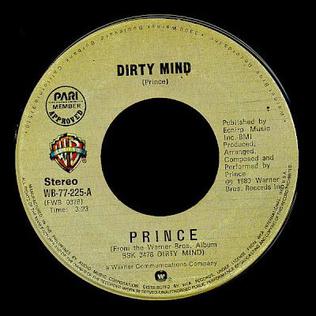
"Dirty Mind" is the follow-up single in the US, and title track to Prince's third album, released in 1980. The song is built around a keyboard riff created by Doctor Fink, which dominates the song. The demo-like song lacks a chorus, and is a stark departure of the smooth R&B sound of Prince's first two albums. The lyrics concern sexual thoughts, which are fairly representative of the other songs from the album. The single's B-side is the ballad "When We're Dancing Close and Slow", from the previous year's Prince. "Dirty Mind" reached number sixty-five on the soul chart. Along with the tracks "Uptown" and "Head", "Dirty Mind" reached number five on the dance chart.

"Gotta Stop (Messin' About)" is a song by Prince, released in the UK as a follow-up single to support his third album, Dirty Mind. The single was not an album track, though it was written at the same time, and possessed a similar sound. "Gotta Stop Messin' About" marked the first time Prince released non-album tracks, which, especially as B-sides, would become a prominent part of his career.

"Do It All Night" was the lead single in the UK to support Prince's third album, Dirty Mind. The song is an ode to sex, and Prince exclaims that he wants to do it all night. The song opens with a simple keyboard hook before a prominent bass guitar kicks in, along with rhythm guitar and live drums. The song consists of two verses and several repeats of the chorus. Also featured is a keyboard solo in the bridge. The song opened Prince's Dirty Mind tour. The B-side of the track was the controversial Dirty Mind ode to oral sex, "Head".
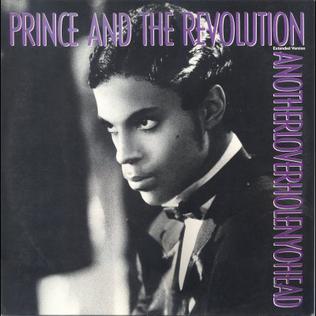
"Anotherloverholenyohead" is a 1986 song by Prince and The Revolution, from the album Parade, the soundtrack to the film Under the Cherry Moon. The song is essentially a solo performance by Prince, with backing vocals from Susannah Melvoin, and the horn section of Eric Leeds and Atlanta Bliss on the extended version. The song also features a string arrangement by Clare Fischer. The song is set in a minor key, and written around a piano chord sequence, although the arrangement emphasizes an upfront guitar synth and a drum machine. The lyrics are about a man trying to reclaim a lover who is intent on leaving him for another. The song's title is a combination of the main idea of the song, and the line "U need another lover like u need a hole in yo head" from the chorus. The single received a 12" extended release with intricate piano work, a horn overdub and some dance commands from Prince.
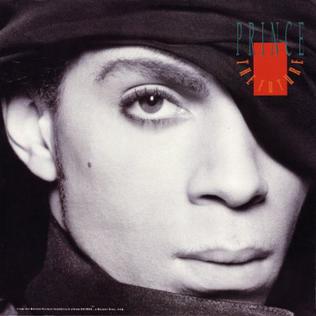
"The Future" is a song from American musician Prince's 1989 Batman soundtrack, and the final single released from the album. The single was not the album version, but a remixed version by S'Express' Mark Moore and William Orbit. "The Future" was released as a single only in Europe. The standard European 7-inch single was backed with the album version of "Electric Chair", but on the maxi-single, "Electric Chair" was also remixed by Moore and Orbit. Moore and Orbit's remix of "The Future" is house-inspired, whereas Prince's original is minimalistic. Moore and Orbit substituted a muted, pulsating beat in place of the original elements of Prince's song. Moore and Orbit also removed Prince's original bassline, synthline, and snippets of sampled dialogue. This would be the last time Orbit would work with Prince for several years. In most countries, neither "The Future" nor its B-side were a hit on the pop or dance floors. The single peaked at #9 in the Dutch charts.
"Private Joy" is a song by American musician Prince from his 1981 album Controversy, released as the B-side of the single "Do Me, Baby". The song describes how Prince will never reveal the identity of his secret lover. This is the first time Prince used the LM-1 machine, which he would use throughout his career.
"Computer Blue" is a song by Prince and The Revolution. Released on June 25, 1984, it is the fourth track on Prince's sixth album, Purple Rain, which also served as the soundtrack to the film of the same name. In the film, the song represents Prince's character's angst at the budding relationship between the characters played by Morris Day and Apollonia, the latter of whom he desires, and he performs it in front of the two during The Revolution's set at a nightclub with the aim of upsetting them. The song was composed by Prince with credit to his father, John L. Nelson, for the guitar solo based on a piano instrumental written by Nelson and Prince. He titled the instrumental piece "Father's Song" and recorded it on piano for the film, though onscreen it was portrayed as being played by Prince's character's father, played by Clarence Williams III. On the box-set Purple Rain Deluxe (2017), a different and longer recording of "Father's Song" was included.


















